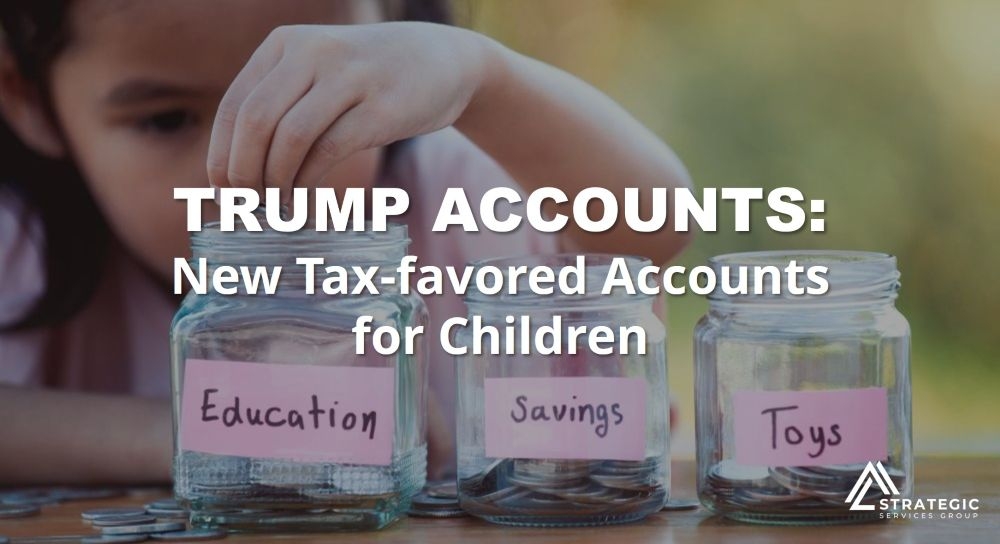New Tax-Favored Accounts for Children - Trump Accounts

On July 4, 2025, President Donald Trump signed a major tax and spending bill, commonly referred to as the “One Big Beautiful Bill Act” (OBBB Act), into law. The OBBB Act includes a variety of changes for employee benefit plans. Notably, it creates a new type of federal tax-favored account for children, called Trump Accounts, effective for tax years beginning in 2026.
Employers that establish a Trump Account Contribution Program can contribute up to $2,500 per year on a tax-free basis to the Trump Accounts of employees’ dependents (or teenage employees). This program must be established pursuant to a written plan document and must meet certain tax rules that apply to dependent care assistance programs (DCAPs).
Key features of Trump Accounts include the following:
- Children born in 2025-28 may be eligible to receive a special $1,000 contribution from the federal government;
- Annual contributions are generally limited to $5,000 and may only be made beginning 12 months after the OBBB Act’s enactment and only until the child reaches age 18;
- The accounts are treated similarly to traditional individual retirement accounts (IRAs) for tax purposes, although taxpayers’ contributions are not tax-deductible; and
Withdrawals are only permitted after the account beneficiary reaches age 18.
Key Aspects
- Trump Accounts may be established for all eligible children, although children born in 2025-28 may be eligible to receive a $1,000 federal funding contribution.
- Contributions may be made by parents, relatives or other taxpayers.
- Although taxpayers’ contributions are not tax deductible, earnings grow tax-deferred.
- Withdrawals are permitted after age 18.
Employer Contribution
- Employers can make tax-free contributions to the Trump Accounts of their employees’ dependents.
- The annual limit for these contributions is $2,500 (adjusted for inflation after 2027).
- This contribution program is subject to specific compliance requirements.
Basic Rules
Trump Accounts are a new tax-advantaged savings program for children under the age of 18, effective for tax years beginning in 2026. These accounts will operate similarly to traditional IRAs, where investment earnings grow tax-deferred. According to the White House, Trump Accounts will give children “the chance to experience the miracle of compounded growth and set them on a course for prosperity from the very beginning.”
Eligible children born between Jan. 1, 2025, and Dec. 31, 2028, will receive a one-time $1,000 contribution from the federal government to a designated Trump Account. To receive this contribution, a child must be a U.S. citizen with a Social Security number. Trump Accounts may be established for children not born within this four-year period, although they will not be eligible for the government’s $1,000 benefit.
Trump Accounts may receive contributions of up to $5,000 per year from parents, relatives, guardians or other taxpayers. However, unlike traditional IRAs, these contributions are not tax-deductible. Employers may also contribute up to $2,500 per year to the Trump Accounts of employees’ dependents (or teenage employees) on a tax-free basis. These contribution dollar limits will be adjusted for inflation beginning after 2027.
Until a child reaches age 18, their Trump Account must be invested in a mutual fund or exchange-traded fund that does not have annual fees or expenses of more than 0.1%. In general, withdrawals are not allowed before age 18. Distributions are generally taxable to the extent they exceed taxpayer contributions.
Employer Contribution Programs
The OBBB Act allows employers to contribute up to $2,500 per year on a tax-free basis to the Trump Accounts of their employees’ children or their teenage employees. Employers that want to make these contributions must adopt a written plan document describing the program and comply with the following tax rules that are also applicable to DCAPs:
- Nondiscrimination: The program’s eligibility rules, contributions or benefits cannot discriminate in favor of highly compensated employees or their dependents;
- Employee notification: Eligible employees must receive reasonable notification of the program’s availability and terms; and
- Expense statement: On or before Jan. 31 each year, employees must be provided with a written statement showing the amounts paid or expenses incurred by the employer in providing the program during the previous calendar year. Note that, for DCAPs, employers report dependent care benefits on employees’ Form W-2.
Action Items
The IRS is expected to issue guidance on Trump Accounts in the future, which will likely address eligibility criteria, implementation timelines, specific rules that apply to employer contributions. and administration details. Employers interested in a Trump Account Contribution Program should watch for this guidance.

 Prev
Prev

